The ConnectED UArctic project saw Knút Háberg Eysturstein and myself (Kalpana Vijayavarathan-R) from the University of the Faroe Islands landing in Rovaniemi fortified by blueberry juice to face the late-night air that woke up tired bones and minds.
On Monday May 8, we arrived in the University of Lapland greeted warmly by Sara Ihamäki, coordinator for the UArctic network, Professor Tuija Turunen, Dean of Teacher Education and leader of the UArctic Thematic Network on Teacher Education for Social Justice and Diversity and UNITWIN/UNESCO Network on Teacher Education for Social Justice and Diversity and Natalia Chitalkina, research coordinator. Our lunch session comprised of meaningful conversations with the three of them. Cultural differences, educational issues and projects in the Nordic countries, the importance of mobility and the role of the University of the Faroe Islands in engendering academic commitment for social justice and equity were explored and discussed.
In the afternoon, Sara showed us around the university facilities and presented us with office space where we could sit and work during downtime, and the acknowledgement of the fact that travelling academics are still ‘on duty’ was much appreciated by both of us. The day proved the setting for fortifying minds with crucial and focused information. Insightful meetings and discussions with educators set the stage for exploration of several avenues all underpinned by the ethos of equity and social justice in education.
Kalpana met with Elizabeth Alssen, University Lecturer, Faculty of Education who teaches English. She offered a solid description of English language teaching and the useful cooperation the faculty has with the university of Oulu in teacher education. Emphasis was based on Content and Language Integrated Learning (CLIL), content-based approaches to teaching foreign languages, ICT in foreign language teaching and virtual environments in learning where emphasis was placed on project-based method to empower learners and engage them actively in using digital approaches in context.
It became apparent that teacher education in Finland enjoys great interest and commitment from the government. The enviable position of Finnish teachers and respect for them in society has most certainly contributed to excellence in teaching that appears to be an agreed upon strategy for the country to create a diverse and multi-competent society. It appears that the Faroe Islands has a lot to learn to progress in this meaningful direction.
Knút met with Vesa Tuisku who teaches Music with an emphasis on Music Technology in Music Education. Knút and Vesa discussed music traditions and how they are perceived and implemented in Nordic music cultures and in Music Education in the Nordics. Vesa demonstrated the traditional Finnish instrument the kanteleet and how it can be taught and performed in school settings. Knút discussed the traditional vocal music of the Faroe Islands, which developed because of the absence of musical instruments on the islands in pre-modern times, and how there are therefore no traditional instruments as such in the Faroe Islands, though the instrumentarium of Western music culture did make its way to the Faroes in the late 1800s and early 1900s. Vesa also discussed the music culture of the Sámi as well as the folk ballads derived from the Kalevala and the sister collection Kanteletar. Vesa and Knút furthermore discussed ways of implementing music technology, especially music notation software in music teaching, both individually and in groups.
Kalpana and Knút both had an insightful meeting with Ulla Kemi, who teaches Sustainability and Outdoor education at the University of Lapland. Curricula are revalidated every three years, and this allows for weeding out and updating them in a meaningful manner to ensure constructive fit with the learning outcomes, though at times it could be time consuming. The fundamental drive to creating awareness of sustainability and its significance for posterity gave rise to discussions on how educational trajectories can shape current and future societies. Human capital too must be sustainable and be treated with respect, which brought the focus back to social justice and equity in education.
We had a very thought-provoking meeting with the New Zealand delegation on perspectives of digital citizenship in Indigenous education contexts. There was a clear indication of New Zealand’s focus on informed decision-making for policy creation through practical field research visits to Finland and neighbouring countries to explore their take on the issue and gather best practice. Issues touched upon included mis/disinformation in New Zealand and how media literacy is not currently embedded in the NZ curriculum. The online environment is rapidly changing and navigating it is fundamental to the young people. Their project delves into gaining insight on the challenges facing young people online, what an effective media literacy curriculum would include, how schools could be equipped for this and what programmes and interventions may be effective. As NZ lacks a national strategy for this, it concerns educationists given that media literacy is a 21-century skill, and hence the delegation intends to gather solid evidence to shape governmental policy through meaningful input.
The representative for the TRUST-project and Sami language and culture education, Inker-Anni Linkola-Aikio – Post doc highlighted the significance of the pivotal need to ensure that Sámi education was fully in tune with the Sámi identity and way of life. TRUST is a three-part joint research project involving the Faculties of Law, Education and Art & Design.
On Thursday May 10, together with Sara Ihamäki, we replenished our info-filled minds with a visit to Korundi Art museum, which sent peaceful and harmonious waves through our very being as we drank in the creative expression of psyches moved to artistic expression in unique and myriad ways. Some of the descriptive texts allowed sharing of the artists’ mode of thinking and inspiration. These served as a reminder of how teachers use creativity in teaching in contextual harmony within their subjects and the increased call for creativity in education. The museum showcases beautifully the multi-faceted nature of creativity that cannot be easily captured in words as it is like light through a prism casting variegated hues that are awe-inspiring, thrilling and humbling.
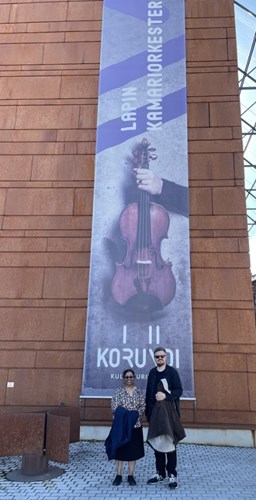
Kalpana and Knút at the Korundi Museum
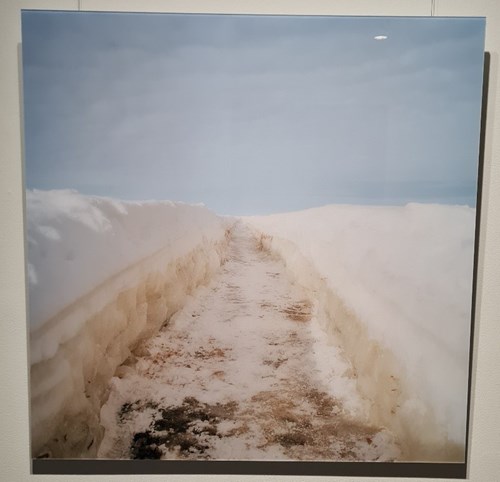
Attempts to Split the Sea (Antti Laitinen)
In the bid for sustainability in education, outdoor pedagogy offers an approach to increasing awareness among the teachers and the taught. The photo below with its accompanying text struck a chord in us.
The crevasse appeals to the aesthetic and spiritual sense of the human being – both caretaker and destroyer of the earth and brings one’s thoughts to how easily as teachers we can build or break the wellbeing of students, and the ethical and professional responsibility that makes teaching and teachers unique. Where such thoughts occur, greater must be the humility of accepting that education must be in the forefront of several SDGS, not least the unwavering commitment to equity and social justice, whereby education becomes truly sustainable in endorsing in action “no child/student left behind”.
On Monday, May 15, we were very happy to participate in Erika Sarivaara’s course “Sámi Presence in Educational Settings”. It was very motivating and beneficial to join Erika’s class on this issue, where through audio-visual input, students were taken through the revitalization of the Sámi language, the significance of language nests, and the importance of being proactive in language preservation, wherein families and governments have key roles. Apparently, Norway leads the way in ensuring the preservation of Sámi language and culture through affording the necessary resources. Knút had a presentation on “Challenges to music education and language in the Faroe Islands” and Kalpana on “Faroese as a minoritized language & challenges to teaching in Faroese as a second language & Experience as an immigrant learning Faroese & impact on my identity”.
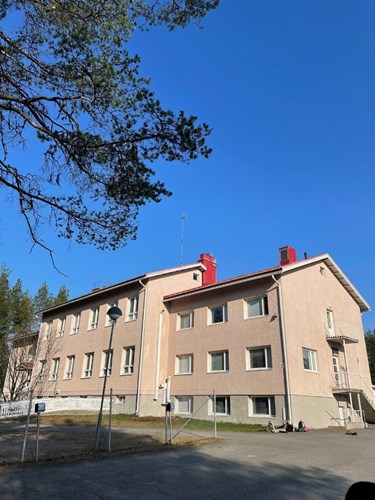
Vikajärvi school
On Tuesday, May 16, we paid a visit to Vikajärven Elementary School, which is located a half hour drive north-east from Rovaniemi. It was a heart-warming visit to this country-side school, which currently has 27 pupils across different age groups with two teachers and a special needs teacher. The headmaster and teacher Jussi Korpi gave an insightful presentation of the school and showed us around the facilities and premises as well as the surrounding area which lends itself well to outdoor activities and physical education. The holistic approach of Finnish elementary school education appears to be a good fit for this setting, where the staff are required to teach several subjects across different age groups and approach their teaching subjects in a connective fashion. Music and singing seem to play an integral role in the school as both teachers teach this subject. We were able to attend a class with the older pupils where we were able explain why we were visiting and to ask the pupils questions with the headmaster as translator. By request, the headmaster brought out his guitar and the class sang a Finnish language song together. An engaging experience which displayed an open-mindedness and inclusiveness amongst pupils and staff. Afterwards, we paid a visit to the adjacent gymnastics and theatre hall where Tarja Kallatsa was teaching a dance routine with the younger pupils, and we were able to observe a part of these activities. Vikajärven Elementary School also aims to play an active role in the local community, which spans a large geographical area where the pupils are brought in by car each morning from quite different localities. In addition to bringing together the pupils and their families, the school also lends itself to community activities of different kinds. All in all, an enlightening visit which again proves the respect that the teaching profession enjoys in Finnish society.
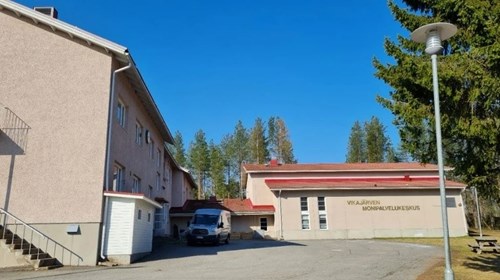
Vikajärvi school
On Tuesday afternoon, we were back at University of Lapland, where we had a very rewarding meeting with Professor Tuija Turunen and doctoral students at the Faculty of Education. This was a welcome opportunity to discuss in-depth the challenges of being a PhD student and a researcher in educational fields including Educational Science, Sustainability, Mathematics, English as a Second Language and Music Education. Insights, frustrations and personal stories on the journey to and from PhD studies were shared by everyone, after which they presented their doctoral projects with questions and comments from the group.
On Wednesday, May 17, the day began at the Lapin University Teacher Training School, where the Principal, Maarit Ala took us on a detailed tour of the school ably assisted by young Bayden – an eighth grader - who did a consummate job of presenting his school and its ethos. In both schools, conversations with students proved fruitful as one pupil from each school used phrases like “feeling safe and secure” in the school, pointed out that there was no bullying, they could be themselves and felt there was always help to be had from the adults in the institutions – be they head of schools, teachers, special needs teachers, guidance counsellors, etc. This made our hearts sing as a safe and secure environment, where one can be oneself is fundamental to facilitating student motivation and a sense of belonging, and thereby learning.
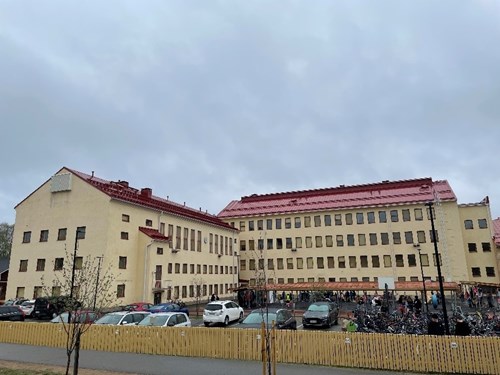
Teacher training school of University of Lapland
Very often, the two of us were able to jointly reflect and draw conclusions and comparisons which enriched our professional relationship and created a mutual understanding of how we viewed our visits. It helped us rework our evaluative frameworks with which to comprehend our own faculty in the light of our multifaceted experiences.
We visited Santa Village, which is at the forefront of tourist attractions in Rovaniemi. There was a childlike delight in taking a picture at the site and sharing in the fun of visiting Santa’s home. This allowed a trip down memory lane of childhood and cognizance of the developing scepticism of our children about Santa and similar figures which creeps in as they grow older.
Teacher education needs to inculcate critical curiosity and resilience consciousness pro-actively in pre-service and in-service education, so our graduates can hopefully enable children/youth to hold onto the sense of curiosity that promotes learning and student agency, while exhibiting responsiveness to changing times and societies. Our visit repeatedly had us reflecting on the importance of our roles in the teaching profession and wondering how to make research-based teaching even more fundamental to everything we do in education, so a holistic development of our students becomes the fulcrum of what we do.
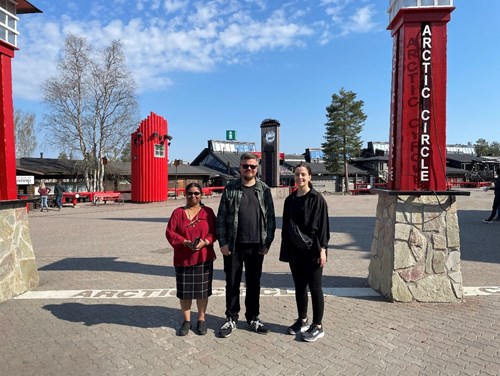
Kalpana, Knút and Sara at the Arctic Circle
Hope you enjoy our Vlog below:
Text written by: Kalpana Vijayavarathan-R and Knút Háberg Eysturstein
Photos: Kalpana Vijayavarathan-R and Knút Háberg Eysturstein
Original blog can be found on the Teacher Education website: BLOG: The land of a 1000 lakes nourishes the mind…
